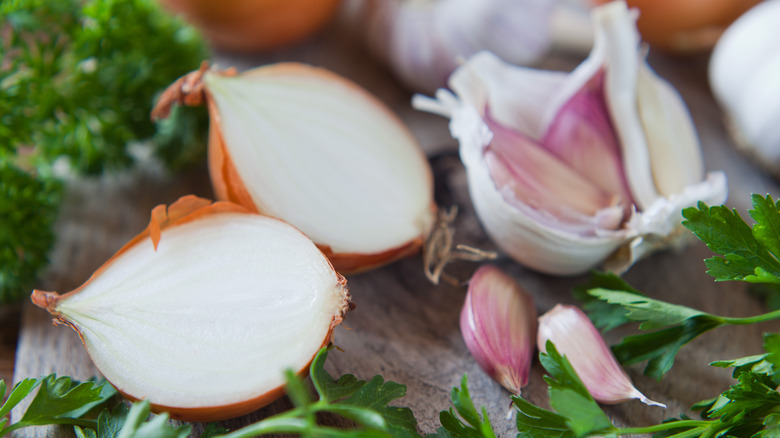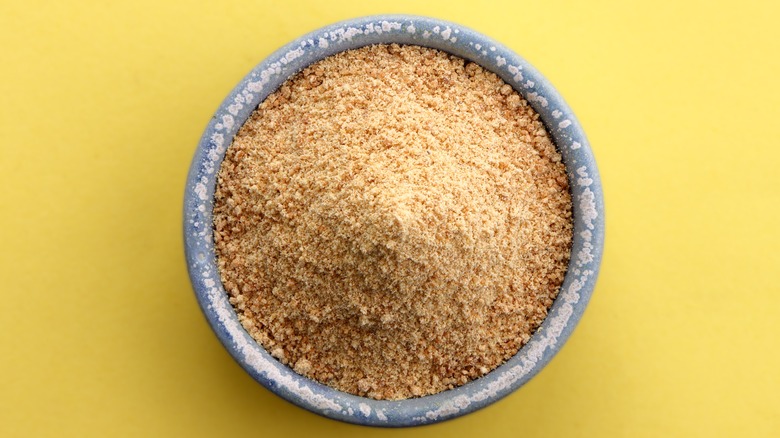With 'Joyfull,' Radhi Devlukia Shows Plant-Based Cooking Has Never Been Easier - Exclusive Interview
These days, finding a plant-based cookbook is a simple task. Finding a plant-based cookbook that can actually make your life a bit easier? That's a bit more rare. For nearly two years, Radhi Devlukia — a clinical dietician and nutritionist, self-taught cook, Ayurvedic health counselor, and social media superstar — has been developing a cookbook to do just that. Now, the fruit of her labor, titled "Joyfull: Cook Effortlessly, Eat Freely, Live Radiantly," has arrived on store shelves.
Devlukia's cookbook is full of gorgeously designed pages depicting nearly 130 plant-based recipes. Throughout, she tackles some of the biggest challenges of transitioning to a vegetarian or vegan diet and offers some encouraging new directions for those who have been plant-based for a long time. There are planning tables and elaborations on crucial mindset shifts. The meals, beverages, and snacks in "Joyfull" feel like a natural extension of the vegetable-forward social content that has grown Devlukia's social following to over two million followers. In many places, it feels even more personal than her online work, thanks to the familial and cultural influences she has woven into writing it. Recently, Tasting Table had the opportunity to speak with Radhi Devlukia for an exclusive interview about her cookbook, healthy home cooking tips, and more.
The major themes of 'Joyfull'
How can you compare and contrast the type of Ayurvedic cooking that you have constructed the book around to the conventional principles of that diet?
I wouldn't necessarily say that my recipes are meant to be or are Ayurvedic. This isn't an Ayurvedic cookbook. But what I have done is incorporated a lot of Ayurvedic principles that have really helped me along my way, whether it's wellness rituals or practices, and even the basic principles of how to eat an Ayurvedic way. I've incorporated that in the book because I don't believe in living 100% ... I think living 100% in an Ayurvedic way can be quite difficult for this day and age. What I've chosen to do is share the principles and the mindset behind it, and then people can pick and choose how they can use the recipes.
If you are trying to avoid nightshades, there are recipes in there for that, and alternatives of how instead of using tomato, you can use a carrot and celery base. There are different ways that I've shown that you can incorporate the principles, but I've been honest and shared the recipes that I use because I don't avoid nightshades 100%. It is a big part of an Ayurvedic recipe, a lot of the time, avoiding nightshades. So, I have shared the principles, but I wouldn't say the recipes are Ayurvedic, so it's not an Ayurvedic cookbook.
Could you tell us a little bit about the importance of the Kitchari reset diet that you recommend?
Kitchari is actually something that I grew up eating; if you ask anybody who's from an Indian background, Kitchari is the thing that their mom gave them when they were feeling sick, and they were really under the weather. Kitchari is the go-to for that. I grew up with a love-hate relationship with it until I studied Ayurveda, and I realized how incredible it is for our body.
One, lentil and rice together create one complete protein. Two, basmati rice in Ayurveda and moong dal are seen to be two things that are really soothing to the gut and your digestive system. So the [Kitchari] diet recommends that instead of fasting or doing a full fast if you're trying to reset your stomach, have a mono diet, which means having the same thing every single day for a chosen amount of time.
You can do it for a day. You could do it for three days. You could do it for five days. But what it's doing is it's allowing your gut to reset indigestion because you're having the same thing. But at the same time, you're getting spices that are healing to the gut, and you're getting nutrition that your body needs to feel nourished and replenished without putting too much strain on your digestive tract.
[Kitchari] can help with inflammation. It can help with brain fog. It can help with mood. There are so many things that just being able to abstain from certain things in your life can do for your body, and that's really what the Kitchari reset is around. You can choose to do it once a week. You can choose to do it once a month. Or you can even choose to do it when you're feeling like your body's not working for you or it's really run down. It can be a great hug for your belly on the days that you're feeling a little bit low energy and that you just feel you need some comfort food.
Why you should be skipping onions and garlic
One of the things that I found most interesting about "Joyfull" was the omission of onion and garlic. Could you elaborate on the why and the how behind this?
When you go to a doctor, and if you have gut issues, let's say you've got irritable bowel syndrome, one of the main things that they will also recommend as part of a conventional route is to take away things from FODMAP. Basically, things that irritate your gut. Onion and garlic seem to be that. It really can irritate your stomach lining. It can cause people gas and bloating, and it can cause gut discomfort.
From an Ayurvedic perspective, onion and garlic actually have incredible medicinal properties, but everything in a specific amount is good for you until you use it too much. I think what's happened in our culture, as time has progressed, is onion and garlic have become the staple behind breakfast, lunch, and dinner. Every single meal is based on onion or garlic. Instead of using it for medicinal value in the right proportions, we've overdone it. Now, it's causing inflammation in the gut and discomfort.
I think onion and garlic are like a cheat to make a meal taste vibrant and have flavor. When I took out onion and garlic and started experimenting with spices and different flavors, it elevated the way that I created meals because I wasn't just going to these two flavors that I'm used to every single day. I was able to actually make meals taste so much more complex and have so much more flavor because I was able to experiment and use different spices.
I almost see it for two reasons: flavor and health reasons. Also, through my yoga teacher training, I learned that different foods carry different energies. The way that food nourishes our body, it also affects our mind, too. When you digest the food, they all have specific energetic properties that they release in the body. Onion and garlic seem to be something that, just as they agitate the gut, can also agitate the mind. It has that kind of energy. If you do practice meditation or yoga, it's recommended to avoid the foods that fall into this category.
Regarding more herbaceous relatives to these ingredients, such as chives, spring onions, and garlic scapes, are these things that you also would recommend omitting from diets? Or do you find different values in these ingredients?
I think it's to the degree, I'd say; if you think about chives, you can tell how strong something is by taking one bite from it, right? If you taste wasabi, you taste the tiniest amount — or mustard, and your mouth will blow up. The same with chilies and the same with garlic. If you took a raw bite of garlic or an onion, it's so potent.
But in the same way, when you taste chives, it's a little bit more subtle, and so the degree that you notice it affects you. A big part of it is tuning into our body and listening to it and saying, "I've had an onion in this, but then I had chives, and the chives didn't affect me as badly. Maybe I can incorporate more chives into my life, but maybe I need a few less onions in my day." I would say that they all fall under the same category, yes, but I think I'd say chives are a milder version of onions, and they probably would affect someone's gut less than how strong onions do.
Essential spices to keep on hand
There's a lot of work with spices in "Joyfull," so I would love to get your perspective on really core essential spices that home cooks should have, as well as some of your underrated sleeper picks for pantry spices to keep on hand.
That is a good question. In Indian culture, you usually have something called, I'll say in my language, but you don't have to write this. It's called masala daba, which means it's a box with seven different compartments, and they're your seven essential spices. That's what usually every Indian household ends up having. In my spice box, I usually have cumin seeds, coriander powder; I have a garam masala. I think a garam masala is a great base to start with for someone who doesn't really know Indian cuisine that well. It's a big mix of all the best spices that you need to make something taste like it has an Indian flavor. It's a good, cheap spice to have in your spice box.
I would also say mustard seeds. I absolutely love the flavor of mustard seeds. They actually are very strong and potent and they create really good flavor. What else do I love having in my spice box? Some sort of chili pepper. I'll either have paprika or smoked paprika, something that adds a little bit of a kick to it. Turmeric is another great spice, used across so many different cuisines. I'd say that's a really great spice. Then I love a sweet spice, so cardamom or cinnamon, two great spices that you can incorporate into dessert as well as savory foods. It's quite nice playing with those because you can throw cardamom into your morning milk or even your oatmeal in the morning and your smoothie. But then you could also add it into — I make a chai cheesecake where I throw so much cardamom into that, and I throw cardamom pods into my curries, too, to add that undertone of sweetness through the dish. How many have I given you so far?
Quite a few. I appreciate that.
The undercover one is probably this spice called asafoetida, or hing. It's basically my alternative to onion and garlic. It's a spice, and it actually comes from a resin from a tree. It has such a strong, potent smell. Just a pinch of it that you need to create the same ... It mimics the same kind of smell and notes and flavor as garlic does. I usually mix in some asafoetida into most things that I eat. It's really good for your gut as well. It helps with digestion. So, if that's not a spice you've used, I highly recommend it. It's garlicky and a bit truffly as well.
Considerations for developing plant-based recipes
One of your recipes that I just absolutely loved from Instagram was your collab with Jenna Wends on the curried potato Wellington recipe. What would be your main tips for home cooks who are considering turning classically meat-based dishes into a plant-based form?
Oh, a big part of turning something that was meaty [plant-based] and you're trying to make it flavorful using other means is spices. Create a huge spice cupboard for yourself and use that. I find a lot of people feel plant-based food can be boring or it doesn't taste as good. I think spices are the key to making plant-based food exciting, flavorful, and fun.
Then what I'd also say is don't try and mimic the meat. There are no mock meats in my book. I don't use them in my own personal cooking just because I grew up vegetarian and I wasn't used to the texture. What I would say is lean into the plant-based protein, lean into the natural beans and lentils and tofu, the things that feel a lot more natural to being plant-based.
So, with the Wellington, we didn't try and make a meat substitute. We made it out of lentils and potatoes. It looked the same, but it definitely had a different texture and feel to it. I think also making yourself okay with the changes in texture and the changes of the ingredients that you're going to use and get used to going towards the natural alternatives. You'll feel a lot better using them, too. Lean into recipes that are naturally plant-based rather than trying to make something that usually requires a lot of meat; I think start with that. Start with the dishes that already can be plant-based and that you enjoy.
Radhi Devlukia's favorite dairy-free alternatives
In the same vein, let's say that we have a first-timer who's picking up your cookbook, and they're just starting to venture into plant-based cooking. What do you look for specifically in vegan dairy, cream, or mayo alternatives? What should home cooks consider in terms of quality products that are going to be something they enjoy cooking with?
One of the things I recommend for dairy — obviously, this can be a bit scary to hear at the beginning — but especially cream, making something dairy-free and creamy at home is really easy because all you need are nuts or seeds. You can take some cashews, soak them, blend them with some water or a little bit of plant-based milk, and you can use that as the cream substitute in your curries, in your sweet dishes. I'll make a sweet cashew cream to pour over my apple pie, and at the same time, I'll use a savory one without the sweetness into my curries and my lentils if I want to make them feel a bit creamier. So, I'd say that's a really easy way to do it without having to buy a store alternative.
If I was looking in the stores, one brand I really love with cheeses and cream cheeses is Kite Hill. I think it does a really good job of keeping the ingredients simple. It is always nut-based. I think it's almond or cashew-based. There are minimal ingredients, maybe three or four ingredients, on the back. I usually look for that.
When I see a whole list of more than six or seven ingredients, sometimes there are like 20 ingredients in something. When it says it's based on oils or palm oils, I'd say just avoid them if possible, because they're not going to probably taste as good, and they definitely won't make you feel good. Definitely avoid the things that are based on oils and then seem solid. That's never really a good sign. Miyoko's butter is something that I love. That butter is great. What's another brand that I love? Oh, there's a great cheese brand. It's a smaller brand, but it's called NUMU.
It does a really good cheese, too. As you get more comfortable with plant-based cooking, I definitely say you'd be able to start creating. I love making a good cashew cheese at home that you can use in your sandwich, that melts really well, and that definitely works at home.
Dessert before dinner
Could you elaborate on the importance of eating your desserts before dinner?
Yeah, that's a good one. You still have to eat dinner afterward. You can't just skip the meal. The principle of that comes from the perspective of our taste buds and our digestion. So in Ayurveda, it talks about how when you end up eating food, your gut prioritizes the sweeter taste and starts to break down the sugars first.
So, it's recommended that if you eat your dessert before dinner, it allows your body to actually digest that before moving on to the meal. Whereas if you end up eating the meal and then eating the sugars, what you've eaten ends up sitting and stagnating in your gut, and it will prioritize the sugars that come into the gut. Instead, it's basically saying, "do yourself a favor." Eat the sugars first so your gut can start working on that. Then, when you end up eating your other food, it'll be able to actually focus on the food that you're putting into your belly and digest it properly, rather than sitting and fermenting and then creating gas and bloating in your stomach.
To learn more about Radhi Devlukia, visit here. You can purchase "Joyfull: Cook Effortlessly, Eat Freely, Live Radiantly" here.
This interview has been edited for clarity.






